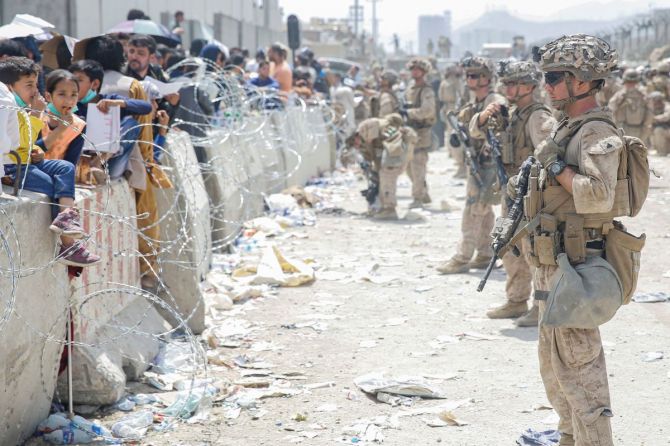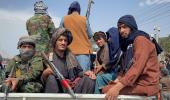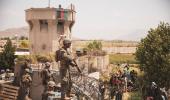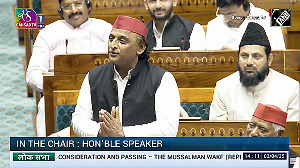The United States military has admitted that a deadly drone strike days before its pullout from Afghanistan was a 'tragic mistake' as it did not kill the ISIS-K planners bent on attacking the Kabul international airport, and instead killed 10 innocent civilians, including an aid worker and seven children.

Briefing reporters on the results of the investigation of the August 29 drone strike in Kabul, General Kenneth Frank McKenzie, the commander of the US Central Command, also said it was 'unlikely that the vehicle and those who died in the attack were associated with Islamic State-Khorasan or were a direct threat to US forces'.
The strike by a Hellfire missile in Kabul on August 29, which was launched in an effort to kill ISIS-K planners, instead killed 10 civilians, he said.
'Our investigation now concludes that the strike was a tragic mistake,' he admitted.
The Pentagon had maintained that at least one ISIS-K facilitator and three civilians were killed in what Chairman of the Joint Chiefs Gen Mark Milley had previously called a 'righteous strike' on the compound in Kabul last month.
However, the strike must be considered in the context of the on-ground situation at the Hamid Karzai International Airport following the ISIS-K attack that killed 13 US soldiers and more than 100 Afghan civilians.
Also, a substantial body of intelligence had indicated the imminence of another attack, McKenzie said.
He said that having thoroughly reviewed the findings of the probe and supporting analysis, he is convinced that as many as 10 civilians, including up to seven children, were tragically killed in that drone strike.
'It was a mistake, and I offer my sincere apology. As the combatant commander, I am fully responsible for this strike and this tragic outcome,' he told reporters.
'Moreover, we now assess that it is unlikely that the vehicle and those who died were associated with ISIS-K or were a direct threat to US forces. I offer my profound condolences to the family and friends of those who were killed.
'This strike was taken in the earnest belief that it would prevent an imminent threat to our forces and the evacuees at the airport,' he said.
US Defense Secretary Lloyd Austin also apologised for the errant strike.
'We apologise, and we will endeavour to learn from this horrible mistake,' he said in a statement.
Austin also offered condolences to the family of Zamarai Ahmadi, the driver of the car targeted in the strike.
'We now know that there was no connection between Mr Ahmadi and ISIS-Khorasan, that his activities on that day were completely harmless and not at all related to the imminent threat we believed we faced, and that Mr. Ahmadi was just as innocent a victim as were the others tragically killed,' he said.
The relatives of the victims at the time told Afghanistan's TOLO News that the airstrike had targeted a car full of civilians.
'If I were with them, I would also have been killed. My brother was a good man, he was like a father to us,' said Ajmal, a relative of the victims.
'They have created a horrifying incident. Children were killed, they were burned. Bodies were slain. Our neighbours came and extinguished the car fire,' said Aimal, the father of a victim.
At the Pentagon briefing, McKenzie said that 48 hours before the drone strike, sensitive intelligence indicated that the compound was being used by ISIS-K planners to facilitate future attacks.
'We were also receiving a significant number of reports indicating multiple avenues of attack, being planned simultaneously by ISIS-K would attempt to harm our forces, with rockets, suicide explosive vests, and vehicle-borne improvised explosive devices,' he said.
'In the 36 hours preceding the strike, our leaders at the airport and in the strike cell received more than 60 different pieces of intelligence related to imminent threats, with some corroborating and some conflicting with events observed from our UAVs flying above Kabul throughout the day,' the commander of the US Central Command added.
One of the most recurring aspects of the intelligence was that ISIS-K would use a white Toyota Corolla as a key element in the next attack.
Since the compound at point number one was the strongest lead for the series of imminent attacks, intense surveillance of the compound was initiated on the morning of August 29, he said.
Giving a detailed account of the strike, McKenzie said the investigation now concludes that the strike was a tragic mistake.
'First, I will stress, this was not a rushed strike. The strike cell followed and observed this vehicle and its occupants for eight hours while cross-checking what they were seeing with all available intelligence to develop a reasonable certainty of the imminent threat that this vehicle posed to our forces,' he said.
While the initial reports indicated a secondary explosion, the initial investigation could only conclude that there was a possible to probable presence of external accelerants that could include either explosive material in the vehicle or ignition of the gas tank of the vehicle.
Subsequent analysis could not rule out the presence of a small amount of explosive material but determined that the most likely cause was the ignition of gas from a propane tank located immediately behind the car, McKenzie explained.
'While the team conducted the strike did so in the honest belief that they were preventing an imminent attack on our forces and civilian evacuees, we now understand that to be incorrect,' he said.
'I'm here today to set the record straight and acknowledge our mistakes. I will end my remarks with the same note of sincere and profound condolences to the family and friends of those who died in this tragic strike,' McKenzie said, adding the US is exploring the possibility of ex gratia payments.
Human rights group, Amnesty International said Friday's admission was an an 'important step toward accountability' but added that Washington needs to take more steps, including paying reparations to family members and survivors of the strike.
'The US must now commit to a full, transparent, and impartial investigation into this incident. Anyone suspected of criminal responsibility should be prosecuted in a fair trial,' said Brian Castner, a senior crisis adviser with Amnesty International's Crisis Response Programme.
House Intelligence Chairman Adam Schiff said in a statement that 'after such a devastating failure -- one that, by the Department's estimate, killed 10 civilians, at least 7 of them children - it cannot be the last step'.
'We need to know what went wrong in the hours and minutes leading up to the strike to prevent similar tragedies in the future,' the California Democrat said, adding that his committee 'will continue to press for answers'.











 © 2025
© 2025